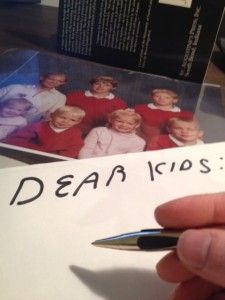Tuesday

Letters to Children: On History
It's difficult to instruct you here, but I suggest you concentrate your reading in three areas: (1) Obtaining a general historical sense; (2) American history; (3) Classical history.
(1) In order to understand much of what you read, you need a general chronological sense. If you cannot immediately identify The Civil War as a nineteenth century conflict, the Reformation as a sixteenth century event, the fall of the Roman Empire as a (generally) fifth century event, Christ's birth as roughly signaling the era of common time (1 A.D.), the golden age of Greece as fifth century b.c., and a host of other events with their time period, you are not historically sound.
High school is the time to start flushing out your gaps in historical knowledge (hopefully, you started building a historical framework in grade school and middle school). I'm not sure how you can build such knowledge, except to read voraciously or take history classes. But here are a few suggestions nonetheless:
(A) Read Russell Kirk's The Roots of American Order. It's an excellent book and not nearly as daunting as it looks. I would highly suggest that you try reading this book before considering the other suggestions below.
(B) For ancient history, read Will Durant's Our Oriental Heritage (volume one of the eleven-volume “The Story of Civilization”). Yes, it's a daunting book, but it provides a great overview of history before the rise of Greece and the “official” beginning of Western Civilization. It also provides some useful knowledge about the Far East and some modern history.
(C) You may also want to read the rest of Durant's eleven-volume set, but I don't really expect you to do so (I haven't).
(D) Study historical atlases and look-up any events that intrigue you. I have a simple historical atlas in my library, as well as a sophistical two-volume set called The Anchor Atlas of World History that provides cryptic details of what the maps portray.
(E) Read about any era or event in history that interests you and “follow the threads.” No historical event takes place in a shell. If you, for instance, think World War II is interesting and want to understand it fully, you must trace its roots back to WWI, which will cause you to delve into events of the nineteenth century. In order to understand the nineteenth century events, you'll need to understand eighteenth century events, and so on.
(F) If you just want to “bite the bullet” and get the job done, you can buy a textbook of Western Civilization and read it. It'll be dry, but if you get a good one, it's probably the most-efficient way to get a sense of history (in order to get a good textbook, try to figure out what Catholic colleges are using for their introductory history classes and get that volume).
(2) For American history, you have a ton of options. I would recommend the trilogies by Walter McDougall and Daniel Boorstin.
(3) For classical history, I suggest the second and third volumes of Durant's “The Story of Civilization” (The Life of Greece and Caesar and Christ).
